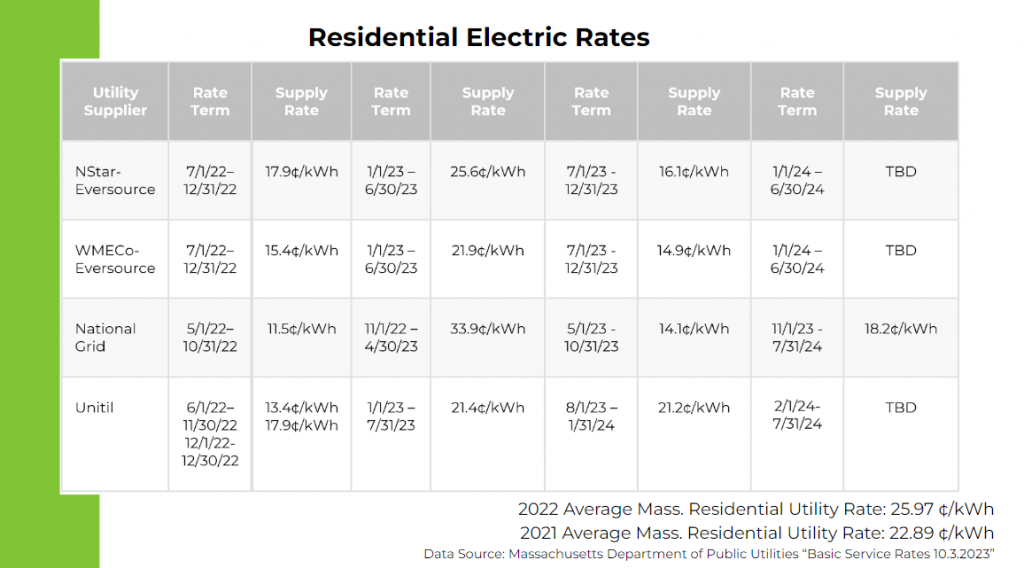
Analysis Reveals the Financial Benefits of Retail Energy Choice, but Proposed Legislation Threatens Consumer Freedom
BOSTON – In 2023, nearly half a million Massachusetts customers chose a competitive electric supplier rather than their default utility provider. Customers choose competitive electric suppliers for a multitude of reasons, including lower rates, predictable bills, 100% renewable energy products, or value-added plans like free nighttime charging for electric vehicles.
An analysis of 2023 Massachusetts utility ratepayer costs shows that consumers on default utility service could have collectively saved as much as $1.14 billion in 2023 had they shopped on EnergySwitchMA.gov and enrolled with the lowest-cost competitive retail supply offer.
“Consumers opt for competitive electric suppliers for many reasons, one being significant cost savings. Whether it’s securing lower rates, managing predictable bills, or aligning with environmental priorities, the potential for substantial savings is a driving force,” said Christopher Ercoli, President and CEO of the Retail Energy Advancement League. “If more
Massachusetts residents had chosen a retail supplier they could have unlocked even greater savings. Recognizing consumers’ ability to actively participate in managing their energy costs is crucial.”
As of December 2023, there were 203 retail supply offers for residents posted on the state’s EnergySwitchMA.gov website, including:
In 2023, utility prices were wildly unpredictable. The cost of supplying electricity changed frequently, with National Grid’s residential supply rate going from 33.9¢ kWh to 14.1¢ kWh and then back up to 18.2¢kWh in a three-term period. This volatility hinders customers’ ability to budget and limits predictability in billing.

Customers in Massachusetts are delighted with the substantial savings they’ve achieved thanks to the competitive nature of retail energy.
“My choice of an alternative energy source is saving me about $200 a month,” said Elizabeth Brown of West Bridgewater. “A difference much appreciated by this 85-year-old widow.”
“I cannot afford electricity through National Grid! My competitive supplier provides a rate that I can afford while providing a roof over my family and putting food on the table,” said Isabelle Parker of Athol. “If I am forced to go with National Grid then I will struggle to provide other life necessities to my family.”
While utilities typically offer a 6-month product, Massachusetts customers who have shopped for their electricity are enrolled in a variety of products, including 100% renewable plans, fixed-rate plans, variable-rate plans, EV charging plans, plans with flat monthly bills, plans that offer home energy products, and 12+ month fixed-rate contracts that allow more predictability in billing.
Over 3,000 Massachusetts residents have voiced their opposition to proposed legislation (H.3196, sponsored by Rep. Frank Moran, and S. 2106, sponsored by Sen. Brendan Crighton) aiming to shut down the residential retail energy market. These residents are urging their elected officials to safeguard their right to choose an electric supplier in line with their personal economic and environmental objectives.
“We were glad to lock in a price with our competitive supplier after such a spike in utility rates last fall,” said Edith King of Petersham. “Please don’t take the power of choice away. It is expensive in the Commonwealth as it is, and energy is a necessity.”
“I already choose an energy provider that is not my local utility so that I can buy 100% renewable energy at a reasonable price,” said Adam Mercer of Needham. “Please don’t limit this competition.”
Background on Shopping for Electricity in Massachusetts
In Massachusetts, customers can shop for the supply portion of their electric bill. The Commonwealth-managed website www.EnergySwitchMA.gov lists available offers so customers can compare and find a supplier that aligns with their economic and environmental goals. In the absence of proactive education for ratepayers about their options to shop, the Retail Energy Advancement League developed a shopping guide to help customers navigate the EnergySwitchMA website with explanations of contract terms and helpful shopping tips.
For interviews with local electric customers about their support for the competitive market, contact Andrew Farnitano at 925-917-1354 or andrew@crawfordstrategies.com.
About Retail Energy Advancement League (REAL):
REAL is a national advocacy organization dedicated to the expansion and modernization of American retail energy markets. In many states, utility monopolies still control the electric market and customers can’t choose where they buy their electricity and gas. States with restructured markets enable companies to compete with utilities and they create access for
customers to choose from a variety of products available on the electric grid, such as 100% renewable energy, free home charging for electric vehicles, carbon offsets for gas products and fixed-rate products.